The best business books we read in 2019
American businesses in 2019 reckoned with the ongoing trade war with China, the lasting impact of the #MeToo movement, the increasing politicization of consumer brands; the national opioid crisis and resulting courtroom battles, more retail chain closures, a near-record parade of CEO exits, and the poor performance of unprofitable Silicon Valley tech unicorn IPOs, to name just a few of the year’s biggest stories.
President Trump’s erratic tweets about the Federal Reserve moved markets. Nike vowed to clean up its corporate culture and CEO Mark Parker stepped down. Uber, Lyft, Pinterest, and Peloton went public, and their stocks struggled. Sears filed for bankruptcy, then got saved—for now. WeWork shelved its IPO plans, ousted its founder, and made job cuts. Four pharma giants settled opioid lawsuits on Ohio. Boeing faced lawmakers in D.C. over its 737 Max jet, and so did Facebook over its cryptocurrency plans.
Some of our favorite new business books this year tackled some of those huge stories (“Fentanyl Inc,” “Beaten Down, Worked Up”), others told gripping stories about one company (“The History of the Future,” “Super Pumped”), and others gave one executive’s perspective on an entire career (“The Ride of a Lifetime,” “What It Takes”). All of them gave us a great read.
These were the Yahoo Finance staff’s favorite business books we read in 2019—ten published this year, plus eight published prior to 2019 that we read this year. Our tastes ran the gamut, so don’t take this as a definitive “Best Books of the Year” ranking. Take it as us offering friendly recommendations for your next pleasure read.
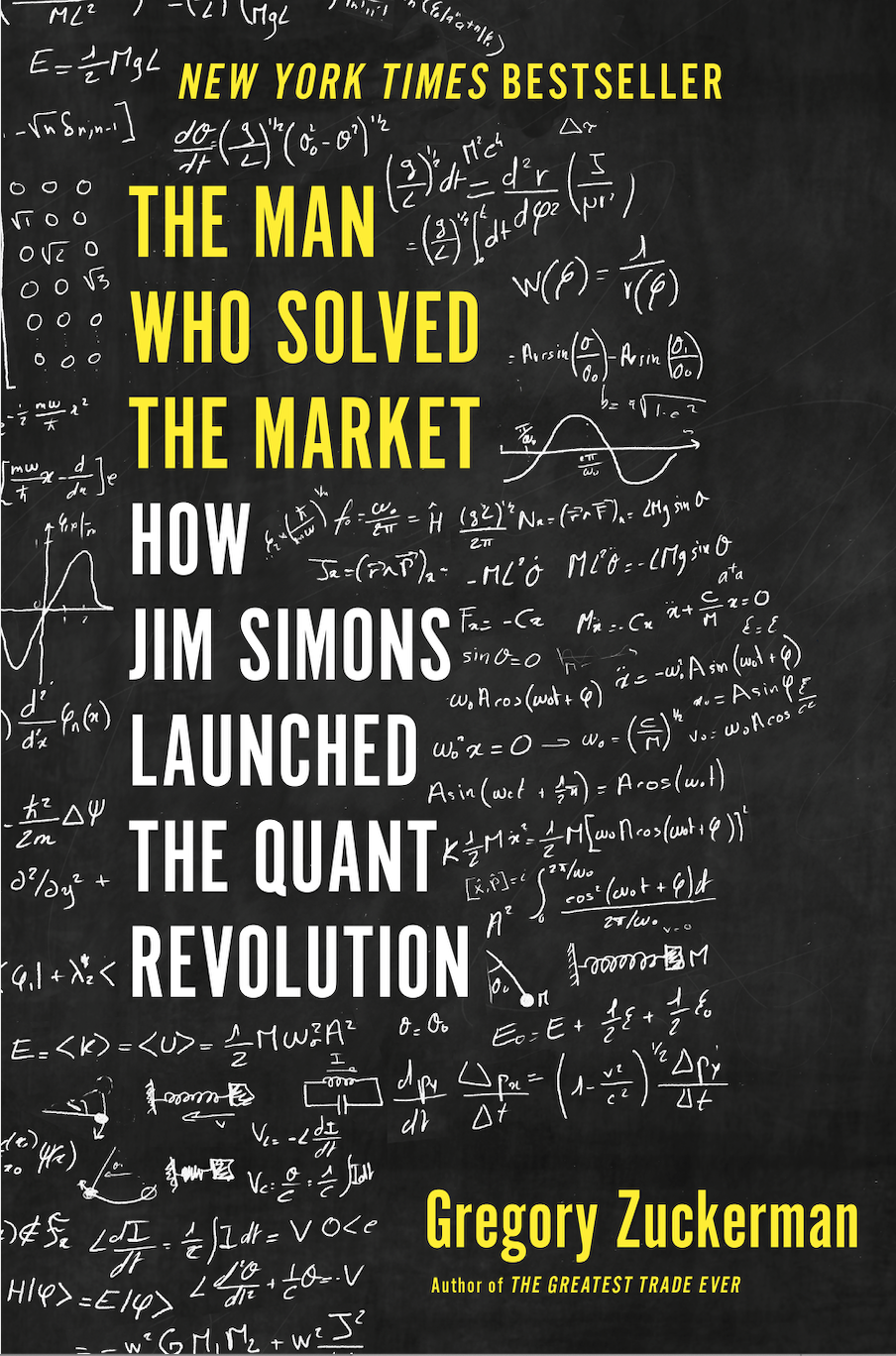
The Man Who Solved the Market: How Jim Simons Launched the Quant Revolution by Greg Zuckerman
You often hear about must-read books. This is one of them. Actually I should qualify that: It’s only a must-read if you care about the markets, investing, making money, American politics, Donald Trump, elections, Facebook, and how we got to the point where algorithms control shopping, Hollywood, and pretty much everything we do.
The book is about Jim Simons, an award-winning mathematician who built Renaissance Technologies into one of the biggest, most successful hedge funds of all time. Now with over $60 billion under management, Renaissance has an unmatched record. Its flagship Medallion fund has racked up annual gains of 39.1%, after fees, since 1988. That’s better than Dalio, Soros or Buffett.
Simons managed all this using math and computers, so-called “quant” investing. A few others have done the same kind of thing, including D.E. Shaw, Citadel, and Millennium, but a number of markers set Simon apart. Not only is he the biggest and the best, he was also pretty much the first, leaving the math department at Stony Brook University to start trading in 1978. But more than all that, Simons’ story is just so interesting: math prof, code-breaker working for an NSA contractor to crack Russian secrets, and finally Wall Street pioneer. Simons’ success came later in life, and it didn’t come easily. He was in his mid-50s when it became apparent that Medallion was really going to make it big, and that Simons would make serious money. And did that money ever become serious. Most of the assets in Renaissance’s funds belonged to its principals, who are now all fabulously wealthy, especially the press-shy Simons, worth over $20 billion. The other high-profile person at the firm was Trump donor Robert Mercer, a former IBM computer scientist who was the co-CEO of Renaissance and also owned Breitbart News and was on the board of Cambridge Analytica. Mercer, once a highly productive member of the team, would cause Simons, a liberal Democratic, all kinds of headaches.
Greg Zuckerman does a terrific job with the story, it’s a wonderful read, but maybe more impressive is how he boils down the math and makes it understandable for mere mortals. I ran into Greg at the FT & McKinsey Business Book of the Year 2019 dinner (his book was a runner-up), and he mentioned to me that he worked with a math tutor to get it all correct.
Finally, I was thinking about Simons and how he compares to other investing greats. Some say, for instance, Simons and Warren Buffett are opposites in that Simons is a quant, while Buffett relies on fundamentals. I would say they are actually similar. Both have figured out a way to sustainably beat the markets, by thinking in ways that others don’t. And they are both irreplaceable except to the extent they can identify people who are smart as they are. Tall order, that. —Andy Serwer, Editor in Chief
Watch Yahoo Finance’s interview with Greg Zuckerman.

Fentanyl, Inc.: How Rogue Chemists Are Creating the Deadliest Wave of the Opioid Epidemic by Ben Westhoff
As someone who writes regularly about opioids, especially fentanyl, and the opioid epidemic in general, this was a fascinating look into how China is playing a major role in the spread of fentanyl across the U.S. The book connects the dots between the pharmaceutical companies and their role in the opioid crisis with the Chinese labs manufacturing the illicit fentanyl and maneuvering it through Mexico to get it into the U.S. Highly recommend it! —Adriana Belmonte, associate editor
Watch Yahoo Finance’s interview with Ben Westhoff.
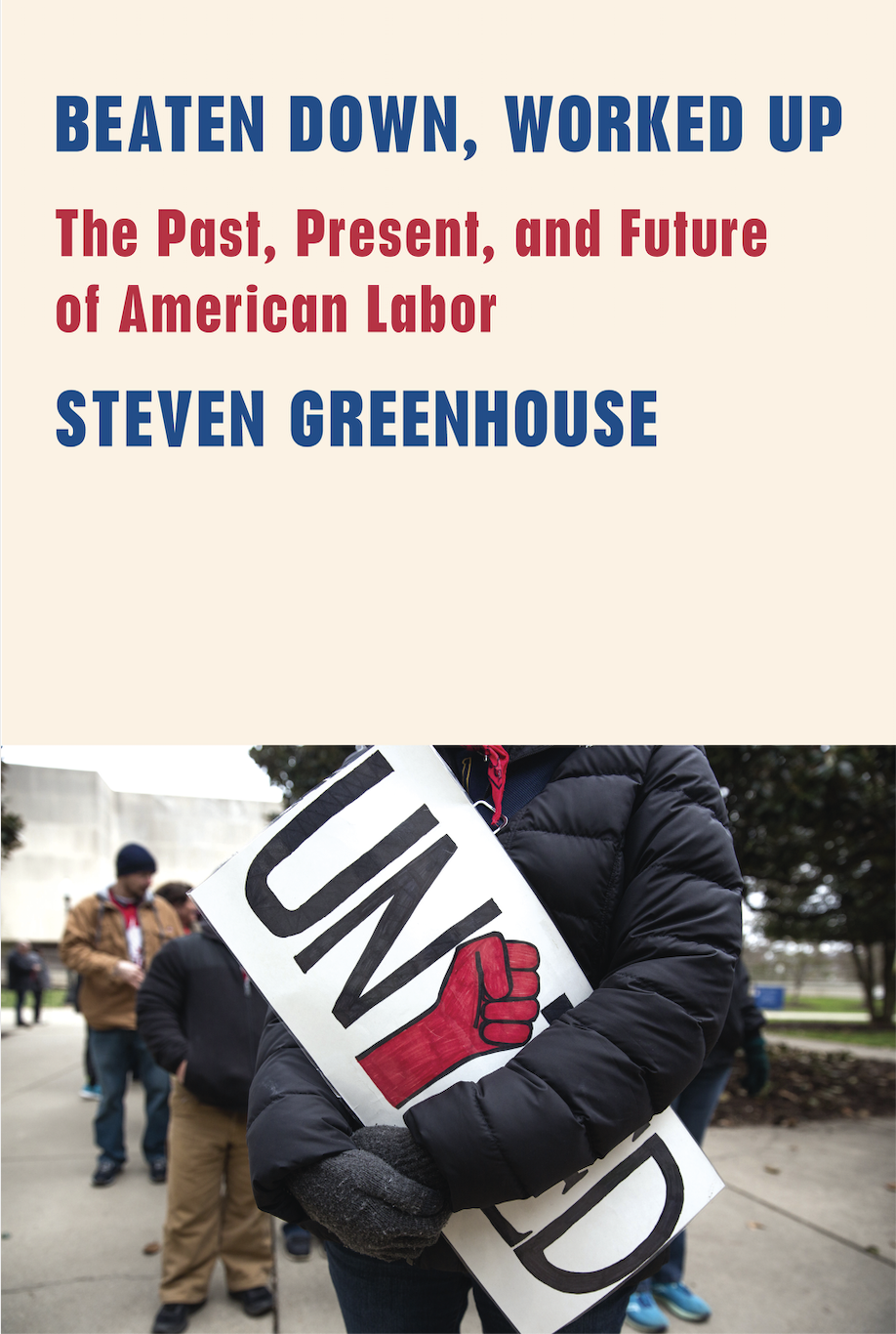
Beaten Down, Worked Up: The Past, Present, and Future of American Labor by Steven Greenhouse
Depending on your politics, the decades-long decline of union power in the United States is either dispiriting or encouraging. Regardless, the trend defies narrative arc. Labor’s fall is steady, boring, and irreversible. But not in this book.
In this sweeping primer on worker power in the U.S., former New York Times labor reporter Steven Greenhouse solves this problem by rejecting its premise. For Greenhouse, unions are a vital part of the labor movement but shouldn’t be mistaken for the whole. Plus, in his view, labor’s heyday of the 1950s and 60s is hardly bygone—and the recent surge of workplace strikes and public support for unions might portend a revival even on that front. It’s no secret that such an outcome would cheer Greenhouse, just skim his Twitter feed. Even so, the book offers an unsparing account of labor’s demise, including a chapter devoted to “self-inflicted wounds.”
Most memorably, Greenhouse profiles modern-day employees who’ve inherited a workplace marked, or not, by labor’s waning influence. They struggle to pay the bills but also to feel dignified or make time for family. In those moments, I wanted to put the book down, but not out of boredom. —Max Zahn, reporter

The History of the Future: Oculus, Facebook, and the Revolution That Swept Virtual Reality by Blake Harris
If you are not a gamer, but you remember the name Palmer Luckey, you probably remember only vague details: nerd genius founder; sold his company to Facebook; ousted from his own company after some kind of political scandal. Now Blake Harris has told the exhaustive (occasionally exhausting) story of Luckey founding Oculus VR and selling it to Facebook. And it is a wild ride.
In explaining the origins of Oculus, Harris basically gives a condensed history of the many, many attempts to take virtual reality mainstream, and how Oculus rapidly became the next great hope for VR geeks: the pure, for-gamers-by-gamers company that could finally pull it off.
But 300 pages into the book, Mark Zuckerberg enters, and Oculus sells (sells out?) to Facebook for $3 billion. What happens next is when the book really hits its stride: push and pull between Luckey and his band of idealists and Facebook’s concerned corporate suits. When Zuckerberg holds his first town hall with Oculus employees after the acquisition, an Oculus cofounder asks, “Some people—not me, of course—but some people think Facebook is evil, so I’m wondering how that will affect the perception of Oculus.” The answer was: it affected it negatively. Oculus devotees were outraged. And in hindsight, the record has largely proven them right.
Oculus, seven years after its founding and five years after it sold to Facebook, is “still not profitable,” Harris tells Yahoo Finance. “But the weird thing is, without them, VR would be dead. They are singlehandedly carrying the industry.”
As for Luckey, he ends the book ousted from his own company after it came out that he donated $10,000 to a pro-Trump group on Reddit that planned to put up Trump meme billboards (it only ever made one). Harris lays out exactly what transpired and how Luckey, who had sought to remain anonymous, was outed by a Daily Beast reporter via Milo Yiannopoulos, and how digital headlines made the story so big and so negative that Facebook pushed Luckey out. You might conclude he got a raw deal, you might not (it’s very clear where Harris lands—he can occasionally come across more as Oculus fanboy than objective storyteller), but the unraveling makes a great read.
And now, with Palmer Luckey having moved on to a drone startup called Anduril, where does Oculus VR sit today? “The easiest way to answer that question,” Harris says, “is that almost every single person who was at Oculus before the acquisition is no longer there, mostly by choice.” —Daniel Roberts, senior writer and show host
Watch Yahoo Finance’s interview with Blake Harris.

Super Pumped: The Battle for Uber by Mike Isaac
In “Super Pumped: The Battle for Uber,” New York Times reporter Mike Isaac tells the story of Uber’s rise and Travis Kalanick’s ruthless obsession with winning. I almost skipped it after reading a similar, but less-than-thrilling book about Uber a couple years ago. I’m glad I changed my mind.
Isaac describes so many captivating (and often horrifying) moments in the Uber saga—from the company's extraordinary efforts to spy on competitors and outsmart regulators to the outbreak of violence after Uber launched in Brazil without really requiring riders to prove their identities. Even the stories I thought I already knew, including Uber’s attempt to make it in China and Kalanick’s eventual ouster, were full of gripping details I had never heard before.
While the inner workings of the company are fascinating, the book might be most interesting when Isaac zooms out to explain how Uber’s story fits into Silicon Valley history. I’m already looking forward to the Showtime series. —Jessica Smith, Washington reporter

That Will Never Work: The Birth of Netflix and the Amazing Life of an Idea by Marc Randolph
This part-business book, part-Netflix biography explains how the idea for Netflix really came about, and how the culture led Reed Hastings to fire Marc Randolph via PowerPoint. I thought the book was really good, and an easy read. It’s an exciting behind-the-scenes look at the founding of one of America's most closely watched companies. It was equally exciting to hear Randolph’s thoughts, in a Yahoo Finance interview, about how Netflix is more prepared to take on Disney than people think. —Zack Guzman, senior writer and show host
Watch Yahoo Finance’s interview with Marc Randolph.
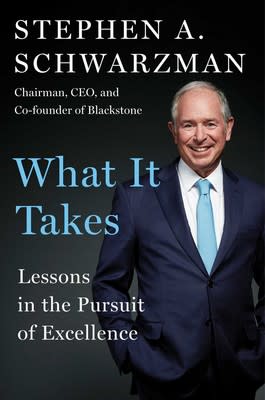
What It Takes: Lessons in the Pursuit of Excellence by Steven Schwarzman
I liked Steve Schwarzman's "What It Takes." It's funny and informative. He gives a comprehensive guide on how to be successful in life and work. I think it's going to be a must-read for every young entrepreneur. —Julia La Roche, correspondent
Watch Yahoo Finance’s interview with Steven Schwarzman at the All Markets Summit.

The Ride of a Lifetime: Lessons Learned from 15 Years as CEO of the Walt Disney Company by Robert Iger
Yahoo Finance’s 2019 Company of the Year is Target, but it very easily could have been Disney. The voracious entertainment giant had quite a year in 2019, from closing its $71 billion 21st Century Fox acquisition to launching its Disney+ service. But Iger’s career memoir reminds you that Disney has had quite the decade.
Iger structures his book according to the major deals he has pulled off during his stewardship: Pixar, Marvel, Lucasfilm, and Fox. He gives a true behind-the-curtain view into his thinking and strategy during those deals, each one of them a risk at the time, which makes this in some ways an M&A how-to. But he also reveals a slew of juicy Disney secrets along the way, including boardroom drama between Michael Eisner and Michael Ovitz, complaints from George Lucas, and the decision to cancel Roseanne Barr’s ABC revival after a single racist tweet.
The book opens with an extremely personal scene: Iger was in China to open Shanghai Disneyland in June 2016 when two crises happened in a two-day period: the Orlando night club shooting (two of the people killed were part-time Disney World employees, and several other employees had friends or relatives who were killed) and, the next day, a child attacked and killed by an alligator at Disney World. Iger called the boy’s parents and cried with them on the phone. “I knew from a lawyer’s perspective that I should be careful about what I was saying, that I should consider whether that was somehow an admission of negligence... but I didn’t care about any of that in this moment.”
Career memoirs are typically vapid, self-serving, and fake. Iger’s comes across as candid and warm. He confirms the rumors that he considered a 2020 presidential run—until Rupert Murdoch gave the Fox deal the condition that Iger stay on as CEO. He makes very clear how carefully he has tried to protect the family-friendly brand of Walt Disney. He reminds critics that his 15 years at Disney have been a mega success by almost any metric, and that when he finally steps down in 2021, he will leave behind quite a legacy. —Daniel Roberts, senior writer and show host

Zen Bender: A Decade-Long Enthusiastic Quest to Fix Everything (That Was Never Broken) by Stephanie Krikorian
Former TV producer turned ghostwriter Stephanie Krikorian writes about her decade-long quest to “fix” everything in her life. Her book is a journey through today’s “wellness” economy, a self-confidence book for women, and a friendly guide for anyone tired of newfangled products/classes/diets that promise to change everything in your life in just 30 days.
Krikorian tried everything from Reiki to “The Class” to Marie Kondo’s tidying method. Does it all... work? “I think if you think it works, or you get a little thread of something that works, then it worked, so there’s a placebo effect,” Krikorian said in an interview with Yahoo Finance. “I also think it’s geared at these A-type, overworked, money to burn [types], and they also are fixated on this idea that there’s gotta be a fix I can buy, something’s gotta be wrong with me and I’ll make this radical effort to make a change. So, you go to a class and it’s $42 for the class, and then there’s collagen-infused water, and everything has CBD oil in it, so it all kind of feeds on itself.” —Andrew Hoffman, senior executive producer
Watch Yahoo Finance’s interview with Stephanie Krikorian.
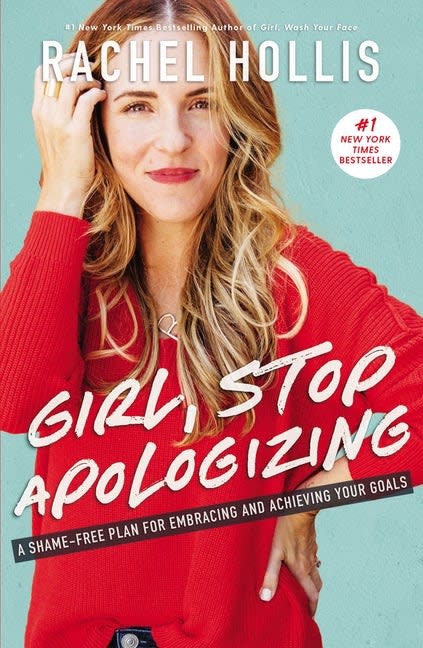
Girl, Stop Apologizing: A Shame-free Plan for Embracing and Achieving Your Goals by Rachel Hollis
When many women are so quick to say “I’m sorry”—even for things that aren’t remotely their faults —author, motivational speaker and blogger Rachel Hollis is telling you to stop apologizing. It’s a deep dive, inside look at how Hollis overcame and continues to face adversity without feeling apologetic.
The book provides active steps to achieve your dreams with practices like the 10-10-1 rule: 10 years, 10 dreams, 1 goal. If you’re in need of major inspiration heading into the new year, this bestseller, along with Hollis’s first book, “Girl, Wash Your Face,” is worth picking up—not to mention that the audiobook is perfect for any commute. —Brooke DiPalma, associate producer
Books we loved this year that were published before 2019:
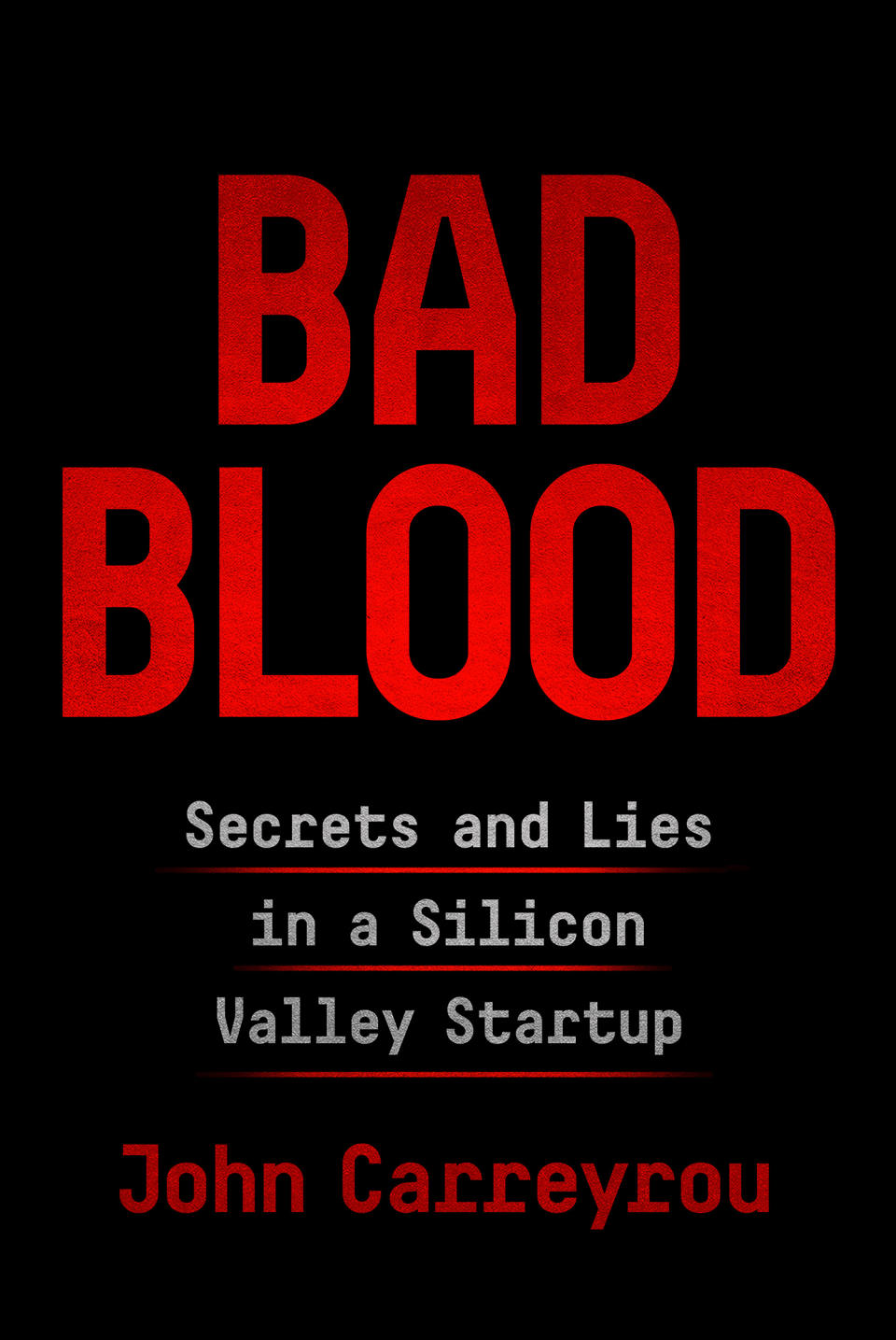
Bad Blood: Secrets and Lies in a Silicon Valley Startup by John Carreyrou (2018)
The book of the year, if you ask me. A certified page-turner that grabs you by the eyeballs and won't let you put it down. The definitive “What Happened and Why” about Theranos, one of Silicon Valley's most shocking and spectacular meltdowns ever, and its infamous founder Elizabeth Holmes. —Javier David, homepage editor
Watch Yahoo Finance’s interview with John Carreyrou.

Saudi America: The Truth About Fracking and How It’s Changing the World by Bethany McLean (2018)
Fracking usually just conjures up images of pollution, because that's easy to understand. But a bad public image is just one of many issues for this industry.
In “Saudi America,” investigative journalist Bethany McLean looks at the financial issues, drilling down past the complexity to reach the core problem: a business model that may never work. Told through the story of the late Aubrey McClendon, the swashbuckling former CEO of Chesapeake Energy, McLean shines a light on an industry that could be on the verge of a crisis—and she puts it into critical geopolitical context. —Ethan Wolff-Mann, senior writer
Listen to Yahoo Finance’s three-part podcast about Aubrey McClendon.
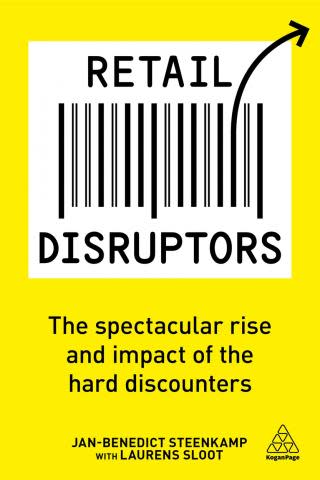
Retail Disruptors: The Spectacular Rise and Impact of the Hard Discounters by Jan-Benedict Steenkamp with Laurens Sloot (2018)
One of the most interesting business books I've ever read. In the U.S., Trader Joe's is the primary way we experience the hard discounter model: few SKUs, barebones interiors, items placed "on the shelves" by workers sticking delivery boxes on pallets. In Europe, hard discounters have been popular for some time and look set to radically shake up the U.S. grocery business with companies like Aldi and Lidl coming for the U.S. market in a big way.
The economics of the hard discounter model are undeniable, delivering margins that are sometimes 4 or 5 times better than a traditional grocer. And while at Yahoo Finance we sometimes act like Target, Walmart, and Amazon are the only companies that sell things, the struggles that Amazon is having with Whole Foods and the work Walmart has done to diversify away from its grocery business show that buying food for the house is still a 20th century experience in a 21st century world. Shoppers know it. Retailers know it. And though no company has completely cracked the grocery code, the eventual winners will reap huge benefits and the losers have limited margin to give away. After reading this book, you'll think the hard discounters have the best chance at winning. —Myles Udland, anchor
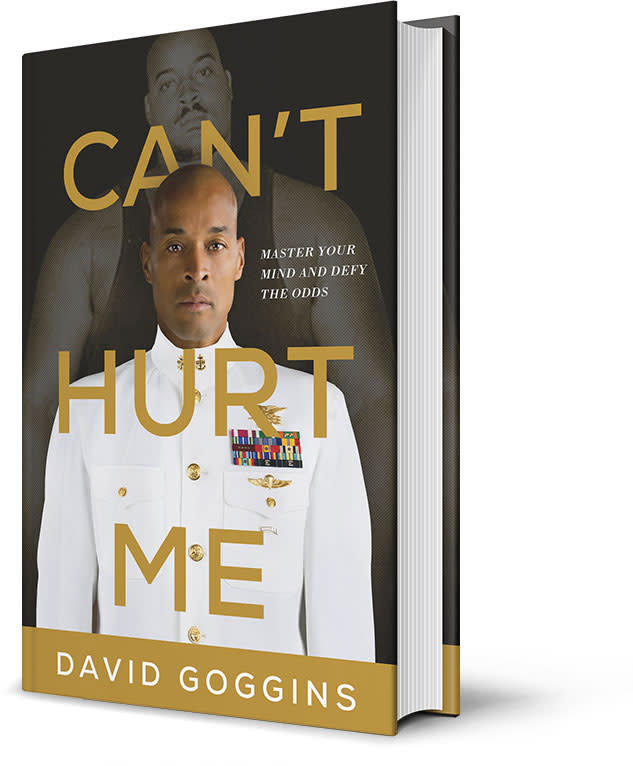
Can't Hurt Me: Master Your Mind and Defy the Odds by David Goggins (2018)
Business books don’t have to be written by a retired CEO or a former member of the economic team of a past presidential administration to help one in business. A large part of getting ahead in business involves constant strategic thinking, self-motivation and the ability to inspire teams. To that end, reading the personal story of former Navy SEAL, Army Ranger, and Air Force Tactical Air Controller David Goggins opened my eyes on what’s required to achieve one’s next level of greatness in business and in life. Goggins’ story is one of struggle, and insane amounts of sacrifice, focus and determination. But in the end, he has come out ahead because of his focus on excellence….and his Instagram feed clearly shows that. Highly recommended inspirational reading to kick off 2020. —Brian Sozzi, editor-at-large
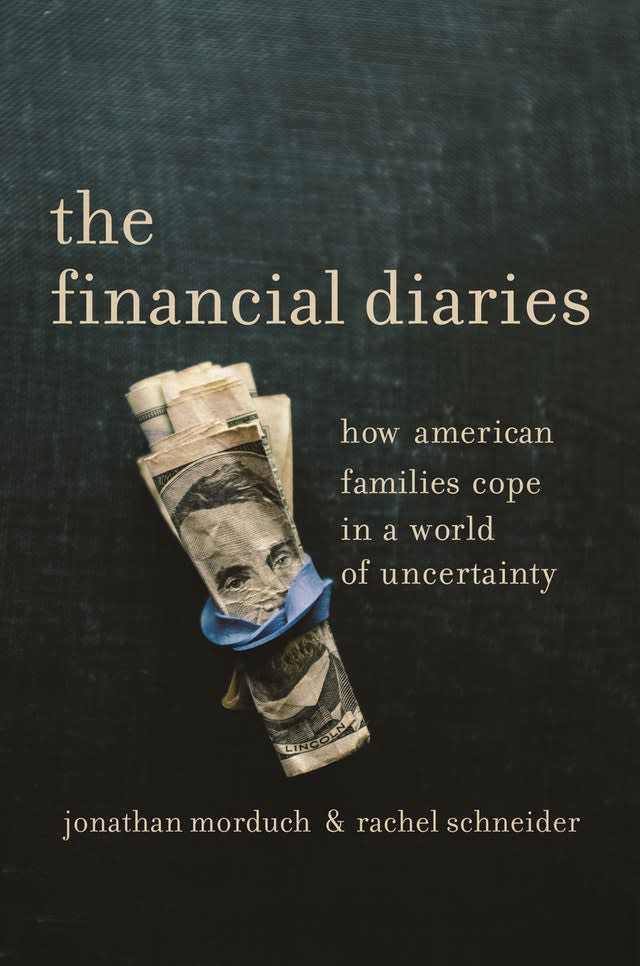
The Financial Diaries: How American Families Cope in a World of Uncertainty by Jonathan Morduch and Rachel Schneider (2017)
Co-authors Jonathan Morduch and Rachel Schneider dig into why low-income and middle-class households in the U.S. are under such financial strain in “The Financial Diaries: How American Families Cope in a World of Uncertainty.” The book follows the lives of 235 families over the course of the year, breaking down how much they earn, spend, save and borrow. It illuminates the tough choices many of them have to make everyday—balancing short-term needs and long-term goals on uneven, unpredictable income. It also upends some so-called truisms in the personal finance world and shows that these people are not irresponsible when it comes to money. They just need more of it—consistently—to get close to anything resembling the American Dream. —Janna Herron, personal finance editor

The Unwinding: An Inner History of the New America by George Packer (2013)
Packer follows six diverse Americans over the course of 35 years to depict a country that has not delivered on its promise that “if you work hard...there will be a place for you, not only an economic place, you will have a secure life,” as Packer told PBS. But it’s not a hopeless picture: Packer also shows an America that strives to pull itself back up and make a better country, even in times of massive economic change. The tapestry of stories from 1978 to 2012 shows America coping with an economic shift away from manufacturing and greedy lending standards that led to the 2008 housing crash. It shows that as inequality grew in the U.S., politicians grew distant from America’s suffering. Published in 2013, this book takes on new meaning as the political divide widens today. Packer tells stories without infusing meaning, leaving the reader to make their own judgments. In an age of politically-colored slants, this book gives a rare opportunity to stop and listen to other peoples’ experiences in a way that has implications for our own. —Sarah Paynter, real estate reporter

Predictably Irrational: The Hidden Forces That Shape Our Decisions by Dan Ariely (2009)
Textbook economics models decision-making as a mathematical process, assuming that people will choose options that return the highest marginal utility (or in regular terms, the most return given the cost). But in real life, no one knows what marginal utility is; sometimes we'll pick a dish simply because someone else at the table ordered it, and other times we'll opt for the "buy-one-get-one-free" offer for no reason beyond "it was free." Through several fascinating social experiments, Duke University behavioral economist Dan Ariely unpacks the flaws of human decision-making and establishes an empirical challenge to traditional economics. —Brian Cheung, Fed reporter

The Years of Lyndon Johnson: Means of Ascent by Robert A. Caro (1990)
This is the second in Caro's four-book series, and this one really qualifies as a business book because it centers largely around how LBJ—who grew up so poor his extended relatives supplied his family with canned vegetables—used illicit means to build his personal fortune and raise massive funds for his campaigns.
In "Means of Ascent," Johnson runs for Senate in a campaign largely bankrolled by Houston contractors Brown & Root, to whom he had steered government contracts when he was a congressman. Those funds enabled LBJ to helicopter all over Texas as part of an effort to court voters (an effort that still fell short—LBJ ultimately had to steal that election and "won" the primary by just 87 votes). "Means of Ascent" also details how the 36th U.S. president bought a crappy little radio station and used his political connections to turn it into a cash cow. Caro, who also wrote "The Power Broker" about New York's infamous developer Robert Moses, is a master at chronicling how people acquire power. And in the case of LBJ, all of that power stems from one thing—unprecedented amounts of political money that LBJ alone could procure. —Erin Fuchs, deputy managing editor
—
Read more books coverage from Yahoo Finance:
Barack Obama's favorite books list: Some of the authors in their own words
The best business books we read in 2018
5 secrets about Disney revealed in Bob Iger’s book
‘Scam Me If You Can’ author Frank Abagnale: Never do these 2 things or I can steal your identity
‘Moneyball’ author Michael Lewis says analytics ‘drained baseball of emotion’

